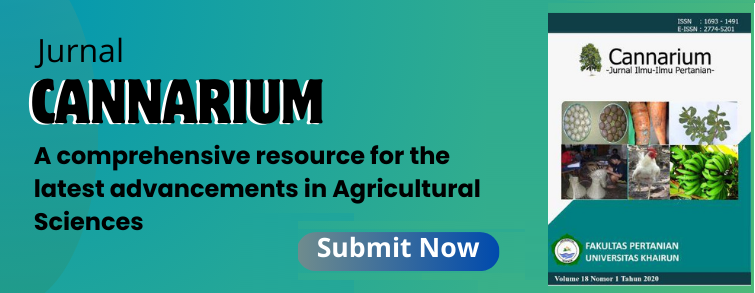Fokus dan Ruang Lingkup
Cannarium is a journal of agricultural sciences. It is a peer-reviewed, scientific journal published by Faculty of Agriculture, Universitas Khairun Indonesia. Cannarium journal aims at publishing original, scientifically research articles and article review that describe and explain a wide range of agricutural fields and disciplines including Agronomy, Horticulture, plant breeding, plant protection, Agribusiness, Agroindustry, Food Science, Soil Science, Forestry and Environmental Sciences, bioenergy, Animal Husbandary and other pertinent related to tropical islands-based biodiversity, agricultural sustainability and ecosystem services. The applications of new molecular, microscopic and analytical techniques to understanding and explaining population and community dynamics is also of great interest. Cannarium is published twice a year in both print and online versions.
Kebijakan Bagian
Articles
Literatur Review
Proses Peer Review
The process can be described as follow.
- The submitted manuscript is first reviewed by an editor. It will be evaluated whether it is suitable for the Cannarium focus and scope or has a major methodological flaw and similarity score by using Turnitin. The decision is rejected or accepted for a review process.
- The manuscript will be sent to at least two anonymous reviewers (Single Blind Review). Reviewers' comments are then sent to the corresponding author for necessary actions and responses.
- Afterward, the editorial team meeting suggested the final decision to the revised manuscript by authors.
- Finally, the Editor will send the final decision to the corresponding author.
- The accepted manuscript then continued to the copyediting and layout editing process to prepare the camera-ready paper.
Review Outcomes
Utilizing feedback from the peer review process, the Editor will make a final publication decision. The review process will take approximately 8 to 14 weeks. Decisions categories include:
- Reject - Rejected manuscripts will not be published and authors will not have the opportunity to resubmit a revised version of the manuscript to Cannarium .
- Accept with Major Revision - Manuscript will be review again after some major modifications are made.
- Accept with Minor Revisions - Manuscripts receiving an accept-pending-revisions decision will be published in Cannarium under the condition that minor modifications are made. Revisions will be reviewed by an editor to ensure necessary updates are made prior to publication.
- Accept - Accepted manuscripts will be published in the current form with no further modifications required
Frekuensi Penerbitan
Cannarium is published twice a year (June and December) in both print and online versions.
Pengarsipan
This journal utilizes the LOCKSS system to create a distributed archiving system among participating libraries and permits those libraries to create permanent archives of the journal for purposes of preservation and restoration



